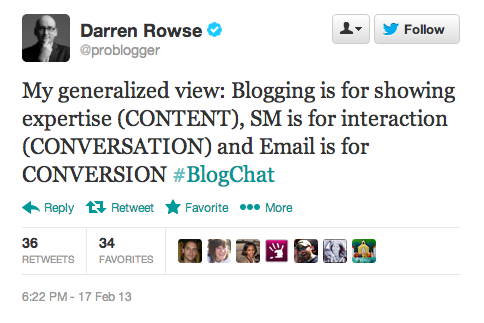Darren Rowse, @problogger on Twitter and blogger at ProBlogger.com, posted the above update earlier this week and I thought it was succinct enough to share. And succinct enough that it needed some pointers for local churches or ministries that could use the distinction.
- Blogging is for Content
- Use the church blog or website to display content: writeups of future events, the pastor’s letters and articles, snippets of UMC.org or UMNS content, and pictures pictures pictures.
- Have a “what to expect” and worship times and whether child care is available and dress code expectations.
- The point is to have well-written content so that when a visitor clicks your website that they can get the information without having to ask about it.
- Social Media is for Conversation
- You can promote blog content or page content on social media. Send the link with a creative title, appropriate #hashtags or official terms for Facebook to categorize.
- RT or repost content so that more people want to follow/like your social media pages.
- Follow or like other pages and people and build relationships so that they follow you. Nothing is sadder than an account that follows 1000% more people than follow them.
- Email is for Conversion
- This doesn’t mean to Jesus, necessarily. It means that you get your perspective into other people’s minds so that they are convicted also of what you write or stand for.
- Treat emails seriously. I learned a long time ago that when someone emails me a question, I give them an answer. Even if it is a big theological question, I give a partial answer and then stop and ask (1) if I can know why the question and (2) can we talk in person. Referral usually means dismissal, but answering too much without context is bad too.
- Make no mistake: this is more than email. This is face-to-face talks, coffee dates, lunches, and such.
So there’s a few ideas of how churches can articulate where they put their emphases on social media as well as how to identify the low points in their digital strategies.
Thanks for reading! Thoughts?


Using a similar methodology…
1. On twitter, I unfollowed bloggers like Michael Hyatt, Scot McKnight, Tony Jones because I use an RSS Reader (Google + Newsify) to stay up to date with their blogs.
2. I try to only follow people on Twitter that follow back and vice versa. Conversation is a two way street. I figure my follow is an investment in you and your follow is an investment in me. I have a Facebook page mostly for church members and family. It is maybe updated once a week.
3. Email is too passive aggressive for serious conversations, so if something needs to be said I think it needs to be said directly. Email can be used to clarify and explain pre/post meeting.
Hello there! I know this is kinda off topic but I was wondering which blog platform are you using for this site?
I’m getting fed up of WordPress because I’ve had problems with hackers
and I’m looking at alternatives for another platform. I would be awesome if you could point me in the direction of a good platform.